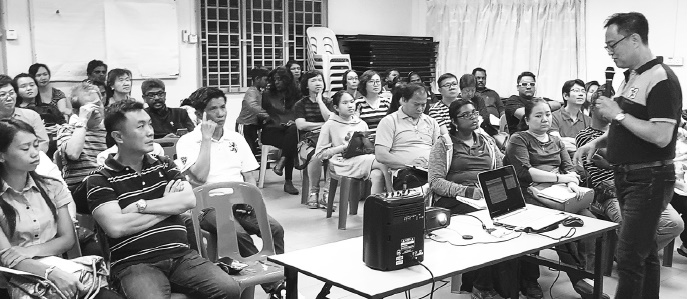Why get married in the Church?
Mixed marriages from different religions are very common nowadays as 80 – 90 per cent of the participating couples are from different religions.
Mar 22, 2019

By Vincent D’Silva
Mixed marriages from different religions are very common nowadays as 80 – 90 per cent of the participating couples are from different religions.
Philip Ng from the Penang Diocesan Family Life Ministry and coordinator of the Penang Mandarin Catholic Marriage Preparation Course (CMPC) helps participants better understand the reasons for marriage in church.
A talk, 100 reasons for getting married in church and after the Church wedding what next?, organised by the Diocesan Family Life & Laity Commission of Malacca Johore, saw Ng sharing his knowledge on the issues for getting married in church, the syllabus of the CMPC which is based on the Catechism of the Catholic Church.
For many, sex before marriage is very common, as about 90 per cent of the people decided to get married because they already had a sexual relationship.
Nowadays, there are many urgent requests for marriage and preparation to get married because of pregnancy. According to Ng, in some cases the couples separate within one year after the baby is delivered.
One of the reasons is the short time in which they get to know each other or the courting duration which is about 1-2 years.
He further explained that sometimes, couples decide to get married because of a sexual relationship.
He said, “The girl’s side seems to be pushing and the man’s side has no choice but to take up the responsibility, even though the couple do not really understand or know each other.”
Ng and his wife, Justina are responsible for constructing the syllabus of the CMPC, which is based on the sacrament of
matrimony in the Catechism of the Catholic Church, Malaysian Chinese culture and the basic needs in a marriage.
Ng said he found that the young couples attending the CMPC did not join any youth activities or any programme in church. As they plan to receive the sacrament of matrimony in church, they have no choice but to attend the CMPC.
According to Ng, after a few years of living together, many decide to receive the sacrament of matrimony after being forced by parents, family members or relatives.
He said, “Some felt it was time to settle down as age was catching up, of if the girl was pregnant, or to provide a sense of security, or if they were financially stable and were ready to have children and to fulfil the commitment or responsibility for each other.”
Ng said that after learning about the various challenges these couples face, he designed a syllabus for a marriage preparation course because “after the church wedding, you must manage your married life” or “important things to do if we want to live a happy marriage.”
He went on to explain that there are five elements for a happy marriage. Firstly, he said, you need to understand the temperament of your spouse.
He said, generally we can categorise the temperament into four types namely: Optimistic, Heavyhearted, Aggressive and Calm, adding that “there are strengths and weaknesses in every type of temperament and couples need to understand and accept their spouses’ temperament and find a balance in the differences.”
The second element, he said, is the family background. “You need to understand the family background and learning behaviour of the spouse. This will help us to be more patient and accepting,” he said. “Healing, change of behaviour, meeting the love language and inner-self growing will take place in a healthy marital relationship.”
Usually in a new marriage, we tend to follow the same rules that have been practised in our previous life and sometimes, those rules are so rigid and hard to be accepted by your spouse.
He pointed out that “sometimes when we have different opinions, we tend to follow what our parents did — this was what our father did when he had a conflict with mother.”
Ng reminded the people to recognise the differences between males and females in terms of behaviour, thinking, expectation and values, adding, “always treat your spouse as your ‘good friend’ and always deposit in the ‘love bank’.”
He reminded the audience that marriage is based on the consent of the contracting parties, that is, on their will to give themselves to each other, mutually and definitely, in order to live a covenant of faithful and fruitful love.
The talk helped many to understand the reasons for getting married in church and what happens next after a church wedding. The participants learnt that a happy and loving family will contribute towards building a peaceful and harmonious society. A peaceful and harmonious society is the place where God will dwell and shower His blessings.
Concluding his talk, he said, “Since marriage establishes the couple in public in the church, it is fitting that its celebration be public, in the framework of a liturgical celebration, before a priest, the witnesses and the assembly of the faithful.”
A question-and-answer session saw the speaker tackling many questions on this topic.







Total Comments:0